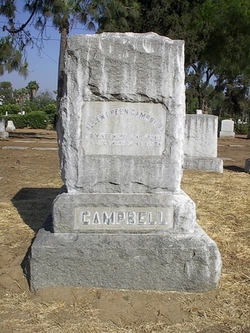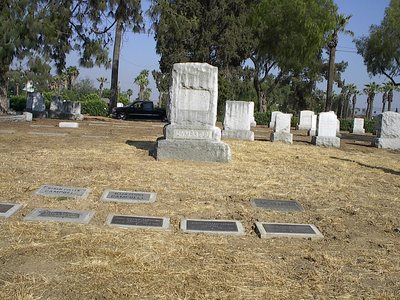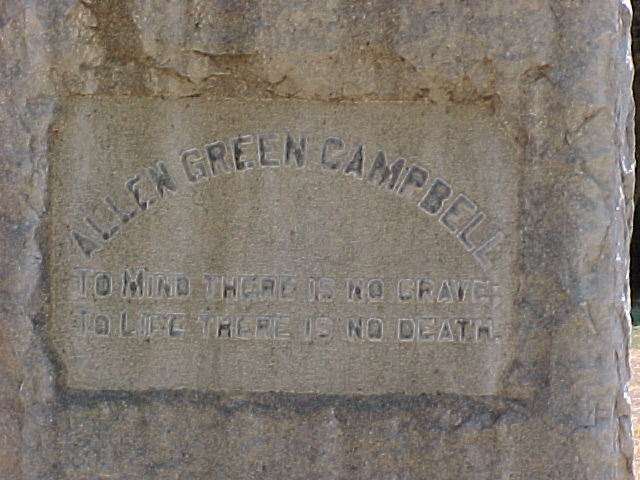Almost every community has its great man, in whom belongs some native quality or power of achievement which elevates him to a pinnacle of real greatness in the eyes of his friends and fellow citizens. The man of Jackson county on whom this distinction most naturally rests is Hon. Allen G. Campbell, whose death occurred at his home in Riverside, California, Monday of last week. The passing of "Green" Campbell brings to a close an eventful business career, which began with farm life at Circleville and culminated with mining operations which covered almost the entire great west. He was the only man in Jackson county, and one of the few in the state, whose wealth ever matched the millionaire mark .... Mr. Campbell was a Missourian by birth, having been born about seventy years ago. With his brother John he drifted into Kansas in the early '60's and with their eyes doubtless set toward the golden land of promise, they drew up at Circleville and ate their first meal on a huge rock which still remains on the farm of H. Moore, east of town. The Campbell boys at once commenced farming, and John, until his death a few years ago at Ontario, remained continually in that pursuit. After three years of farm work, "Green" went to Montana, where he made his first venture into mining. The trip, was not particularly remunerative except in experience, but it encouraged him to penetrate further into the west, and in 1873 he went to Utah and with three partners bonded a silver mine, known as "The Silver Horn," for $25,000. It was a rich strike and from the first turned out "pay dirt." After working it for three years the company sold it through the agency of Jay Cooke, the great eastern financier, to an English syndicate for $5,000,000. Mr. Campbell then had in his credit over a million dollars. Following this deal he went to Washington, D. C., and embarked in the banking business, but through the dishonesty and wild speculation of his partner the bank failed and Mr. Campbell's loss was estimated at from $100,00 to $300,000. As evidence that he usually carried a good bank account it might be stated that at one time he had over a million dollars in government bonds deposited in Linscott's bank in this city. After the bank failure Mr. Campbell's operations were confined almost exclusively to mining ventures in the west. In 1870 Mr. Campbell was married to Miss Flora A. Oursler, a daughter of Rufus Oursler, of Circleville, and to this union was born a son, Charles R. After a few years of married life a legal separation was secured and a few years later Mr. Campbell was married to the divorced wife of a nephew of Brigham Young. Two sons and one daughter were born, and they with their mother, as well as Charles R. and Mrs. Flora Campbell, survive him. In the early nineties Mr. Campbell looking for new fields to conquer, extended his mining operation from Utah to Nevada and lower California, where he acquired and operated valuable gold mines at Vanderbuilt and rich lead ore properties in
the Good Springs district and in southern Nevada. Since then he has spent much of his time in California, and for the past four years has resided in Riverside, where he went for the benefit of
Mrs. Campbell's health. In politics "Green" Campbell was a Democrat of the Bourbon variety. Probably considering Jackson county irredeemably Republican he did not ply the art of politics
here, but while living in Utah in the early eighties he ran for congress on the Democratic ticket against John Q. Cannon, a leading Mormon. Cannon was successful, and Campbell made a trip to
Washington to contest his election before the House of Representatives on the grounds of his being elected by illegal Mormon votes. But Cannon was more successful than his successor, Roberts, of recent memory, and held his seat in Congress. Mr. Campbell exerted a powerful influence in Utah politics nevertheless, and it was authoritatively stated that at the time Utah was admitted to statehood he could have had a seat in the United States Senate for the asking. His refusal to accept the honor was due to a feeling on his part that his educational qualifications were not adequate for holding the office. At the time of his death Mr. Campbell's fortune aggregated between one and two million dollars. His wealth was principally in mining property and real estate ... At one time he was an extensive land holder in Jackson county, but of late years he has either sold or given away most of his real estate, having left at this time only between 300 and 400 acres. As a decaying monument to his memory in Circleville, the old flouring mill on the banks of Elk creek, which was built and maintained by him, still stands. East of town there is also a prospecting well running 1,000 feet into the ground, which he bored in 1880 at a cost of $5,000. Nothing ever came of this venture. Although a resident and citizen of Circleville, Mr. Campbell spent little time there after his mining operations began in the west. Since the first action for divorce was brought his visits to the county have been infrequent, his last being at the time of his brother's death, a few years ago. What is probably of the greatest interest to the people of Jackson county is Mr. Campbell's connection with our educational institution, Campbell University .... The citizens of the county were successful in raising $10,000, and forth with Mr. Campbell sent his check for another $10,000, and in addition purchased and donated the ground on which the University stands. He also made
further donations when it was found necessary to made improvements .... "Green" Campbell was a man among men. He stood over six feet high, was fine looking and possessed a fine physique and good health ....
The Holton Recorder, June 26, 1902.
Almost every community has its great man, in whom belongs some native quality or power of achievement which elevates him to a pinnacle of real greatness in the eyes of his friends and fellow citizens. The man of Jackson county on whom this distinction most naturally rests is Hon. Allen G. Campbell, whose death occurred at his home in Riverside, California, Monday of last week. The passing of "Green" Campbell brings to a close an eventful business career, which began with farm life at Circleville and culminated with mining operations which covered almost the entire great west. He was the only man in Jackson county, and one of the few in the state, whose wealth ever matched the millionaire mark .... Mr. Campbell was a Missourian by birth, having been born about seventy years ago. With his brother John he drifted into Kansas in the early '60's and with their eyes doubtless set toward the golden land of promise, they drew up at Circleville and ate their first meal on a huge rock which still remains on the farm of H. Moore, east of town. The Campbell boys at once commenced farming, and John, until his death a few years ago at Ontario, remained continually in that pursuit. After three years of farm work, "Green" went to Montana, where he made his first venture into mining. The trip, was not particularly remunerative except in experience, but it encouraged him to penetrate further into the west, and in 1873 he went to Utah and with three partners bonded a silver mine, known as "The Silver Horn," for $25,000. It was a rich strike and from the first turned out "pay dirt." After working it for three years the company sold it through the agency of Jay Cooke, the great eastern financier, to an English syndicate for $5,000,000. Mr. Campbell then had in his credit over a million dollars. Following this deal he went to Washington, D. C., and embarked in the banking business, but through the dishonesty and wild speculation of his partner the bank failed and Mr. Campbell's loss was estimated at from $100,00 to $300,000. As evidence that he usually carried a good bank account it might be stated that at one time he had over a million dollars in government bonds deposited in Linscott's bank in this city. After the bank failure Mr. Campbell's operations were confined almost exclusively to mining ventures in the west. In 1870 Mr. Campbell was married to Miss Flora A. Oursler, a daughter of Rufus Oursler, of Circleville, and to this union was born a son, Charles R. After a few years of married life a legal separation was secured and a few years later Mr. Campbell was married to the divorced wife of a nephew of Brigham Young. Two sons and one daughter were born, and they with their mother, as well as Charles R. and Mrs. Flora Campbell, survive him. In the early nineties Mr. Campbell looking for new fields to conquer, extended his mining operation from Utah to Nevada and lower California, where he acquired and operated valuable gold mines at Vanderbuilt and rich lead ore properties in
the Good Springs district and in southern Nevada. Since then he has spent much of his time in California, and for the past four years has resided in Riverside, where he went for the benefit of
Mrs. Campbell's health. In politics "Green" Campbell was a Democrat of the Bourbon variety. Probably considering Jackson county irredeemably Republican he did not ply the art of politics
here, but while living in Utah in the early eighties he ran for congress on the Democratic ticket against John Q. Cannon, a leading Mormon. Cannon was successful, and Campbell made a trip to
Washington to contest his election before the House of Representatives on the grounds of his being elected by illegal Mormon votes. But Cannon was more successful than his successor, Roberts, of recent memory, and held his seat in Congress. Mr. Campbell exerted a powerful influence in Utah politics nevertheless, and it was authoritatively stated that at the time Utah was admitted to statehood he could have had a seat in the United States Senate for the asking. His refusal to accept the honor was due to a feeling on his part that his educational qualifications were not adequate for holding the office. At the time of his death Mr. Campbell's fortune aggregated between one and two million dollars. His wealth was principally in mining property and real estate ... At one time he was an extensive land holder in Jackson county, but of late years he has either sold or given away most of his real estate, having left at this time only between 300 and 400 acres. As a decaying monument to his memory in Circleville, the old flouring mill on the banks of Elk creek, which was built and maintained by him, still stands. East of town there is also a prospecting well running 1,000 feet into the ground, which he bored in 1880 at a cost of $5,000. Nothing ever came of this venture. Although a resident and citizen of Circleville, Mr. Campbell spent little time there after his mining operations began in the west. Since the first action for divorce was brought his visits to the county have been infrequent, his last being at the time of his brother's death, a few years ago. What is probably of the greatest interest to the people of Jackson county is Mr. Campbell's connection with our educational institution, Campbell University .... The citizens of the county were successful in raising $10,000, and forth with Mr. Campbell sent his check for another $10,000, and in addition purchased and donated the ground on which the University stands. He also made
further donations when it was found necessary to made improvements .... "Green" Campbell was a man among men. He stood over six feet high, was fine looking and possessed a fine physique and good health ....
The Holton Recorder, June 26, 1902.
















